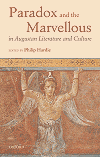
Philip Hardie (dir.), Paradox and the Marvellous in Augustan Literature and Culture, Oxford/New York: Oxford University Press, 2009. Pp. xiii, 388.
- ISBN 9780199231249.
- $130.00.
Recension par David Meban (Campion College, The University of Regina) dans Bryn Mawr Classical Review 2010.03.57.
Présentation de l'éditeur:
The literature and art of Augustan Rome are often thought of as the product of an age of high classicism, characterized by maturity, balance, and harmony. This volume examines the presence of what might be seen as an unclassical love of paradox and the marvellous, and shows that it is an important strain in the poetry of Virgil, Horace, and Ovid, as well as in prose works of history and rhetoric, and in the Augustan visual arts. The volume includes chapters by some of the leading experts in the Augustan period as well as a number of younger scholars. It will be of interest to all students of Roman literature and culture.
Table des matières:
1. Introduction: Paradox and the Marvellous in Augustan Literature and Culture, Philip Hardie
2. Horace's Ars poetica and the Marvellous, Mario Citroni
3. Where the Wild Things are: Locating the Marvellous in Augustan Wall Painting, Verity Platt
4. Against Nature? Some Augustan Responses to Man-made Marvels, Rebecca Armstrong
5. Virgil: A Paradoxical Poet?, Philip Hardie
6. The Question of the Marvellous in the Georgics of Virgil, Alain Deremetz
7. In Search of the Lost Hercules: Strategies of the Marvellous in the Aeneid, Mario Labate
8. Thaumatographia, or 'What is a Theme?', Jurgen Paul Schwindt
9. Phaethon and the Monsters, Alessandro Barchiesi
10. Prodigiosa mendacia uatum. Responses to the Marvellous in Ovid's Narrative of Perseus (Metamorphoses 4-5), Florence Klein
11. Encountering the Fantastic: Expectations, Forms of Communication, Reactions, Marco Fucecchi
12. Constructing a Narrative of mira deum: the story of Philemon and Baucis (Ovid Metamorphoses 8), Jacqueline Fabre-Serris
13. Ovid, Metamorphoses 1.416-51: noua monstra and the foedera naturae, Damien Nelis
14. Alien Divinities. How to Tame Monsters through Aetiology, Gianpiero Rosati
15. Ordering Wonderland: Ovid's Pythagoras and the Augustan Vision, Mary Beagon
16. Delusions of Grandeur: Lucretian 'Passages' in Livy, Andrew Feldherr
17. The Strange Art of the Sententious Declaimer, Joy Connolly